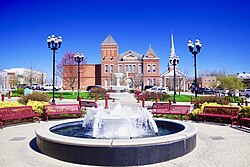McMinnville, Tennessee | |
|---|---|
 Courthouse Square | |
 Location of McMinnville in Warren County, Tennessee. | |
| Coordinates: 35°41′12″N85°46′46″W / 35.68667°N 85.77944°W | |
| Country | United States |
| State | Tennessee |
| County | Warren |
| Founded | August 4, 1810 |
| Incorporated | 1868 [1] |
| Named after | Joseph McMinn |
| Government | |
| • Type | Mayor and Board of Aldermen |
| • Mayor | Ryle Chastain |
| Area | |
• Total | 11.06 sq mi (28.65 km2) |
| • Land | 11.06 sq mi (28.65 km2) |
| • Water | 0 sq mi (0.00 km2) |
| Elevation | 961 ft (293 m) |
| Population | |
• Total | 13,788 |
| • Density | 1,246.5/sq mi (481.28/km2) |
| Time zone | UTC-6 (CST) |
| • Summer (DST) | UTC-5 (CDT) |
| ZIP code | 37110, 37111 |
| Area code | 931 |
| FIPS code | 47-45100 [5] |
| GNIS feature ID | 1652432 [3] |
| Website | McMinnvilleTn.gov |
McMinnville is the largest city in and the county seat of Warren County, Tennessee, United States. [6] The population was 13,788 at the 2020 census. It was named after Governor Joseph McMinn.



